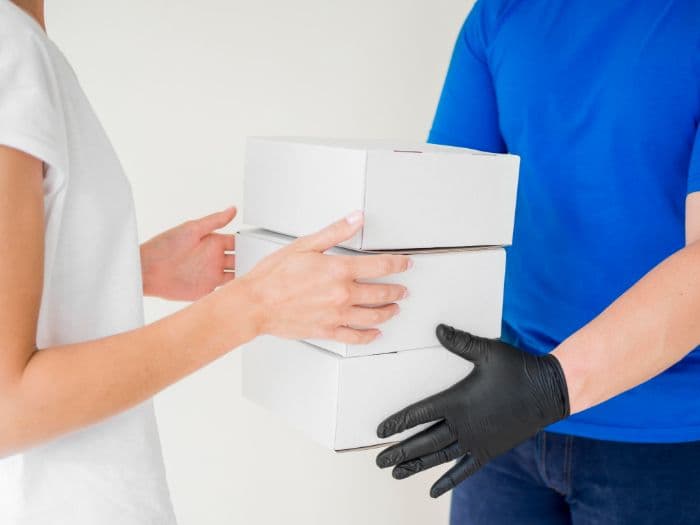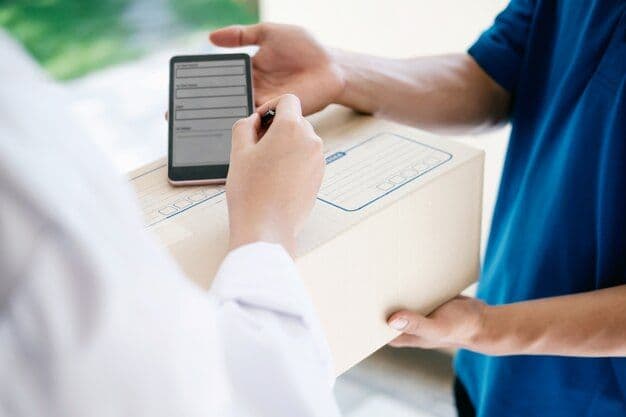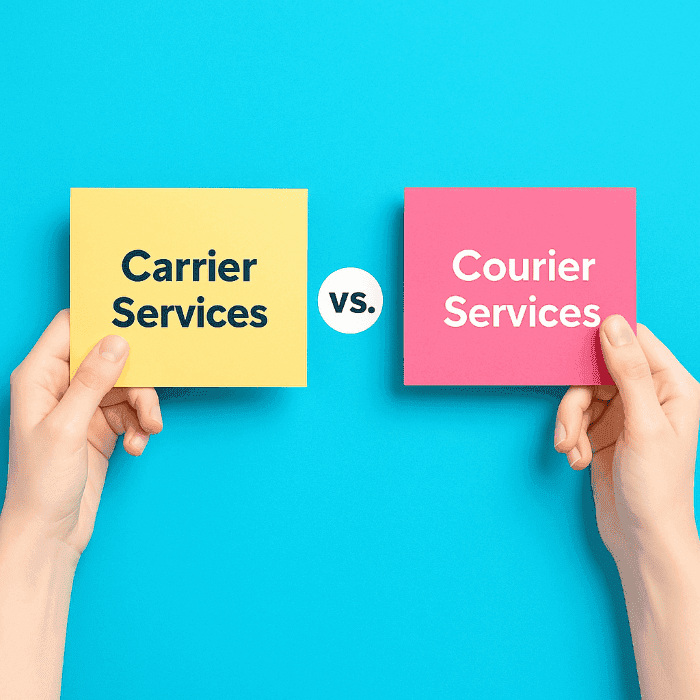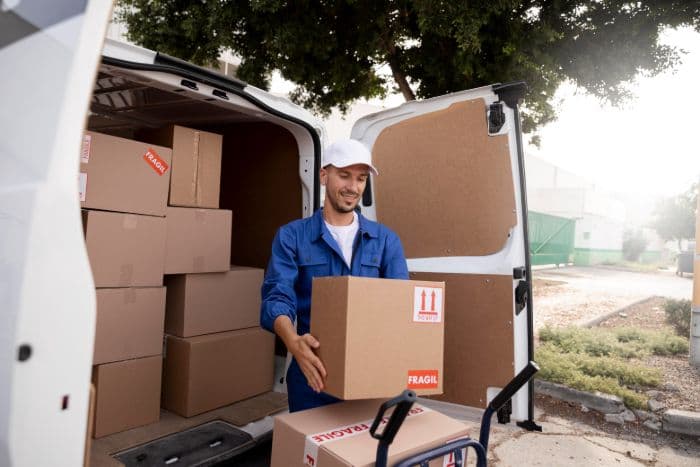In healthcare, delivery failures don’t just slow operations; they put patient outcomes at risk. From lab specimens and medications to critical medical equipment, healthcare organizations rely on precise, time-sensitive logistics every day.
Medical delivery services exist to solve this challenge. They provide specialized transport designed for healthcare environments, ensuring speed, compliance, chain-of-custody, and visibility across every shipment. As healthcare systems grow more complex, these services are no longer optional; they are an operational infrastructure.
This blog explores the essential role medical delivery services play in supporting healthcare operations. We’ll look at how these services enable faster, more reliable transportation of critical items; how they reduce inefficiencies across facilities; and why demand for same-day solutions is surging in major pharma hubs.
Table of Contents:
- How Medical Delivery Services Support Daily Healthcare Operations
- Why Same‑Day Medical Delivery Is Becoming Critical in Healthcare
- Why Medical Delivery Supplies and Equipment Matter for Compliance
- Centralizing Medical Logistics with Airpals’ Parcel Management Platform
- Key Takeaways
- Conclusion: Smarter Delivery Services for a Stronger Healthcare System
- Frequently Asked Questions (FAQs)
How Medical Delivery Services Support Daily Healthcare Operations
Medical delivery services directly support daily healthcare operations by transporting a wide range of critical items and serving virtually every type of medical facility. What’s being delivered? Everything from routine medical delivery supplies (PPE, IV fluids, pharmaceuticals) to highly sensitive specimens and devices.
As reported by CAP Today (2025), 99% of laboratory professionals report that medical courier services affect their work in a typical week, with over 80% describing the impact as “significant.” This underscores the tight dependence of healthcare operations on fast and reliable deliveries.
Need to get critical items delivered fast? Airpals can handle urgent medical shipments when every minute matters. Email us with your order number or start a request through our live chat to get it moving right away.
Operational Challenges Medical Delivery Services Are Designed to Solve
Healthcare organizations face numerous logistics challenges that medical delivery services are uniquely equipped to solve:
Challenge #1 Delayed Shipments
Nurses report that late deliveries force drastic workarounds: 56% of nurses in one survey state they’ve had to reschedule a patient’s procedure due to a delivery issue, and 65% even had to draw a second patient sample because the original was delayed or lost.
Medical delivery services address this with STAT and same-day solutions tailored to urgent medical needs. With optimized routing and healthcare-specific workflows, couriers minimize turnaround time, ensuring critical items arrive on schedule.
Challenge #2: Fragmented logistics
A typical hospital might juggle multiple vendors, one for lab samples, another for pharmacy runs, or depend on staff to drive materials between sites. This fragmented approach creates inefficiencies, higher costs, and a greater risk of something falling through the cracks.
Medical delivery services solve this by providing a one-stop solution. They can handle diverse delivery needs under one umbrella, so healthcare teams no longer waste time managing numerous couriers or making impromptu trips themselves.
Challenge #3 Lack of Tracking Visibility
In healthcare, uncertainty about the status of a delivery can compromise operations. Without real-time tracking, teams are left guessing if a sample has arrived at the lab or if critical medications are en route to a pharmacy.
Today’s medical delivery providers offer digital dashboards and live tracking tools to improve transparency and accountability. At Airpals, we take this further with our Sharable Tracking Page feature, a secure public link that displays non-sensitive delivery details, such as pickup and drop-off locations and real-time status, so every stakeholder stays in the loop.
It’s one more way we make it easy for medical teams to simplify communication and focus on care instead of chasing updates, and it’s ready for you to start using today.
Challenge #4: Compliance and Security Risks
Professional medical delivery couriers also ensure regulatory compliance, overcoming a challenge that general delivery services often struggle with. Transporting healthcare materials involves strict regulatory standards, from HIPAA privacy rules to FDA guidelines for drugs and biologics. Mishandling sensitive items or failing to maintain chain-of-custody can result in legal penalties or patient safety incidents.
Specialized medical delivery services train their personnel in secure handling, temperature-sensitive packaging, and compliance protocols. They use tamper-evident containers and document every step to protect both patient data and medical delivery equipment. This ensures healthcare shipments meet all regulatory requirements with confidence.
Why Same‑Day Medical Delivery Is Becoming Critical in Healthcare
The demand for same-day delivery in healthcare is accelerating, especially in U.S. pharma and biotech hubs. These areas lead the nation in life science activity, housing countless labs and startups alongside major hospitals. Often, critical research materials or lab specimens must be shuttled across town multiple times in the same day for experiments and diagnostics.
In response, medical delivery companies are boosting their same-day capabilities nationwide, often focusing on these healthcare hubs. The result is a new level of agility: a clinic can dispatch a sample at noon and get results back by evening, or a pharmacy can source an out-of-stock drug from a nearby location within hours.
How Airpals Concierge Supports Nationwide Same‑Day Medical Delivery
Airpals Concierge offers a high-touch, nationwide same-day medical delivery coordination solution. Operating in over 100 U.S. cities, Concierge matches healthcare providers with vetted local courier partners and manages each delivery end‑to‑end. Whether handling bulk orders, multi-stop routes, or the shipment of large medical delivery equipment, Concierge ensures timely, reliable execution.
This high-touch approach eliminates logistical complexity, allowing healthcare providers to focus on patient care while Airpals ensures precision handling, route planning, and oversight for every same-day medical delivery.
Why Medical Delivery Supplies and Equipment Matter for Compliance
When it comes to healthcare logistics, small details make a big difference. The right medical delivery supplies keep every shipment safe, compliant, and ready to use, from fragile lab samples to temperature-sensitive medications.
Essential medical delivery supplies include:
- Insulated containers that maintain temperature stability.
- Leak-proof packaging to prevent spills or cross-contamination.
- Absorbent materials that add an extra safety layer.
- Secure seals and clear labeling for proper handling and compliance.
Meanwhile, specialized medical delivery equipment, such as refrigerated vehicles, temperature-controlled storage units, and portable coolers, ensures that temperature-sensitive shipments stay within range throughout transit. Together, these tools protect quality, reduce risk, and help healthcare providers deliver reliable, patient-safe results.
Centralizing Medical Logistics with Airpals’ Parcel Management Platform
In addition to providing on-the-ground courier services, modern medical logistics providers are leveraging technology platforms to help healthcare organizations centralize and streamline their shipping operations. Airpals is one such example: it offers an all-in-one parcel management platform that consolidates both local same-day deliveries and traditional shipping into a single interface.
This kind of solution addresses a key challenge for hospitals and clinics, the historically fragmented nature of shipping, where different departments might use different couriers or carriers, leading to scattered data and billing. With Airpals’ platform, all shipments can be managed in one place, bringing much-needed visibility and control.
Key Takeaways
- Medical delivery services are indispensable for modern healthcare logistics: they deliver critical items quickly and securely across facilities.
- They address core challenges such as delays, coordination gaps, tracking visibility, and compliance through specialized services and infrastructure.
- Demand for same-day medical delivery is rapidly growing, especially in key pharma and biotech hubs.
- Specialized medical delivery equipment and packaging ensure the integrity of temperature‑sensitive and regulated items.
- Platforms like Airpals centralize courier and conventional shipping, delivering cost transparency, streamlined workflows, and full compliance readiness.
Conclusion: Smarter Delivery Services for a Stronger Healthcare System
Efficient medical delivery is no longer a behind‑the‑scenes function. It is a strategic operational system that directly affects patient outcomes, compliance readiness, and workflow efficiency.
When healthcare providers have a reliable delivery infrastructure in place, lab results move faster, medications stay available, and care teams can focus on patients instead of logistics.
If your organization needs a more structured approach to medical delivery and same-day healthcare logistics, Airpals supports healthcare teams with enterprise-ready solutions built for visibility, control, and reliability.
Want to see how this works in practice? Request a demo or contact our team to explore how Airpals can support your medical delivery operations.

Frequently Asked Questions
How do medical delivery services integrate into healthcare logistics workflows?
Medical delivery services integrate into healthcare workflows by managing time‑critical transport of lab samples, medications, and equipment with real‑time tracking, secure handling, and predictable delivery timelines.
Why is specialized medical delivery equipment essential for healthcare shipments?
Specialized medical delivery equipment ensures temperature control, secure packaging, and regulatory compliance, protecting sensitive healthcare materials during transport.
What compliance and regulatory standards apply to medical delivery services?
Medical delivery services must comply with HIPAA, OSHA, and FDA guidelines, including secure handling, data protection, and documented chain‑of‑custody.
What features should I look for when selecting a medical delivery courier?
Key features include real‑time tracking, compliance expertise, cold‑chain support, proof of delivery, and experience with urgent healthcare shipments.
How does Airpals Concierge enable nationwide same-day medical delivery?
Airpals Concierge coordinates same‑day medical deliveries across more than 100 U.S. cities by managing local courier execution with centralized oversight.




